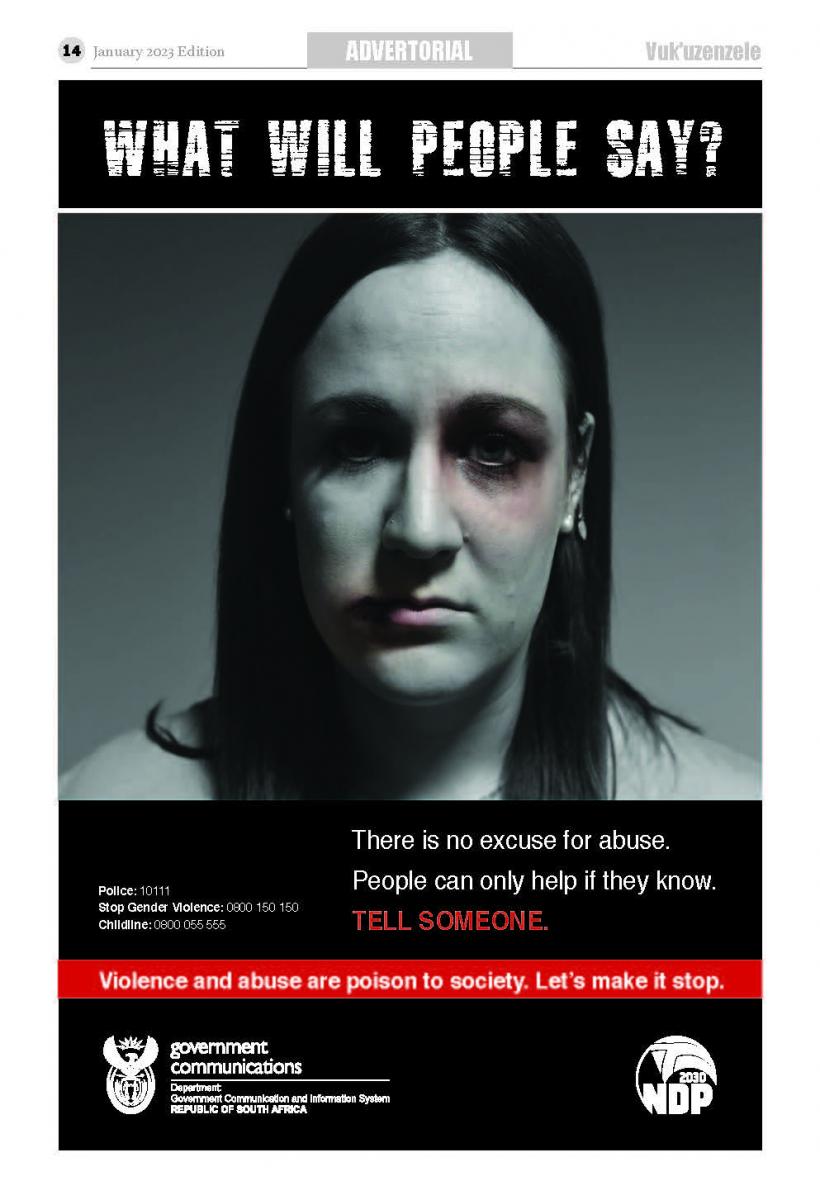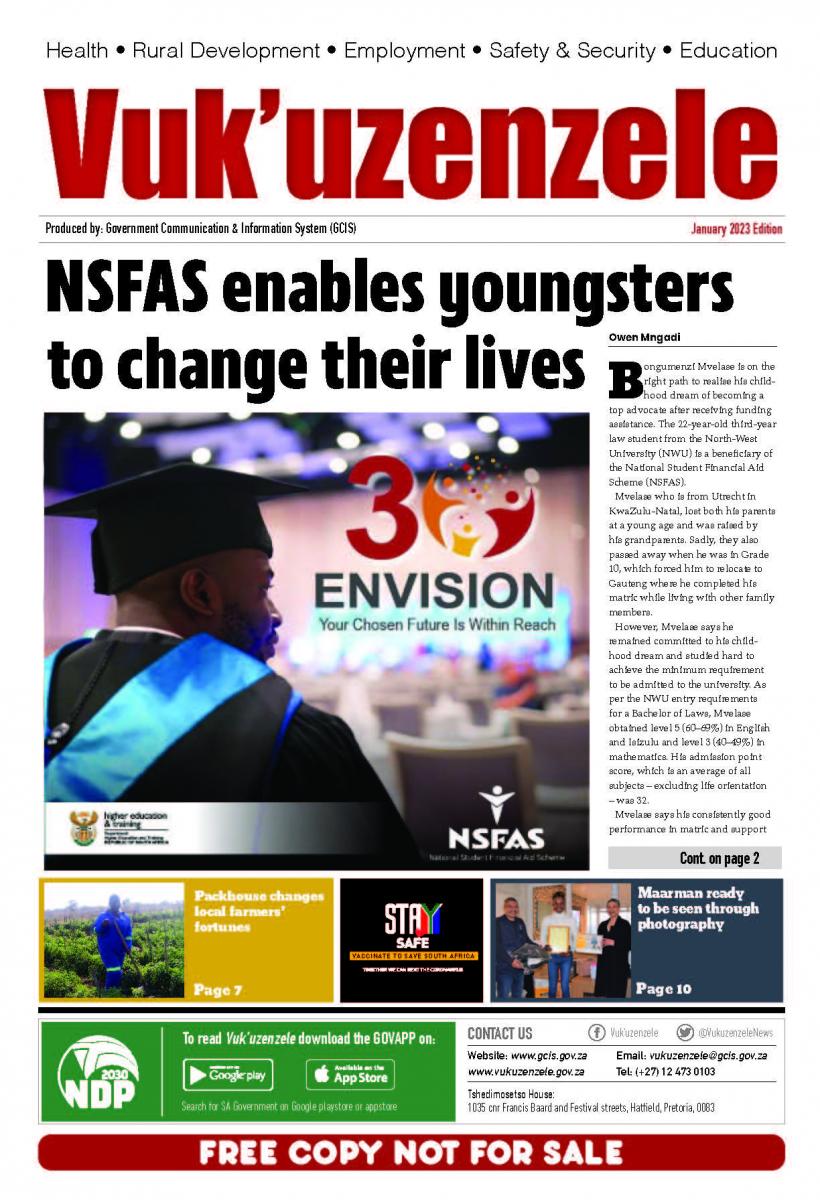Jan 2023
Jan 2023 JoyEnglish PDF version
Translations
Afrikaans
isiNdebele
isiXhosa
isiZulu
Sepedi
Sesotho
Setswana
Siswati
Tshivenda
Xitsonga
A second chance to pass matric
A second chance to pass matric ReneilweIf you could not meet the pass requirements of the National Senior Certificate (NSC) examinations, you can register with the Department of Basic Education for the Second Chance Matric Programme (SCMP).
The SCMP is a matric rewrite programme that was established in 2016 for learners who would like to improve their results or eventually complete their matric qualification on a part-time basis.
Registration for the 2023 SCMP opened in October 2022 and will close on 8 February 2023. You can register at any education district office near you.
According to the DBE, the programme responds to the National Development Plan’s (NDP) order to improve retention rates, reduce dropout rates and leaving no one behind.
The Director of the programme Dr Sandy Malapile says the learner who previously did not succeed in any matric exams can re-register and re-write.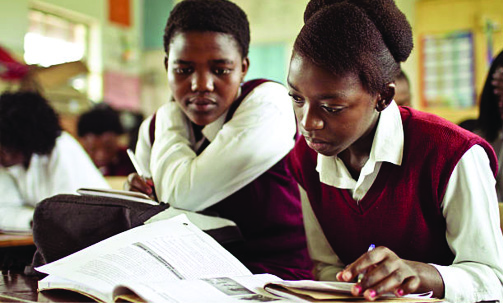
“Even if learners have previously registered for the programme but still did not succeed, they may register as many times as possible until they are satisfied with their results,” he says.
Although the programme has no age restrictions, Malapile says learners who are most targeted are those aged 21 and above, with a minimum qualification of grade 9, 10, and 11 as well as those who are in ABET level 4.
Benefits
Malapile says the programme has a few benefits for learners.
“It gives the candidates a second opportunity towards achieving matric qualification. Learners also receive an additional certificate and the programme further provides learners with the opportunity to improve their results for higher education,” he says.
“With an improved matric results, learners have the potential to get admission in the Technical and Vocational Education and Training (TVET) Colleges and Universities. Learners may also qualify for the Sector Education and Training Authority (SETA) training programmes,” he adds.
Additionally, learners who make use of the programme improve their chances of accessing bursary and job opportunities.
How to apply
To register for the programme, applicants are advised to be in possession of their:
Identity Document or passport
Statement of results or grade 12 certificate
School reports are required for those who have passed Grade 9, 10 or 11 and are 21 years old and above.
For more information, you can email
SecondChance@dbe.gov.za or WhatsApp 063 696 7246 (Administration related only. No voice notes), or use the WozaMatrics WhatsApp line 061 505 3023 for subject-related queries.
You can also visit https://www.education.gov.za/Curriculum/SeniorCertificate/SCRegistratio…
Beware of bogus colleges
Beware of bogus colleges ReneilweThe mushrooming of illegal colleges and practices is a continuous concern for the Department of Higher Education and Training (DHET), especially at the beginning of the new academic year.
Students who have just completed matric and are desperate for admission to institutions of higher education and training sometimes fall prey to bogus colleges.
According to the Minister of Higher Education, Science and Innovation, Dr Blade Nzimande, DHET has the constitutional authority to regulate the private provisioning of college programmes and higher education programmes.
He says the department works closely with law enforcement agencies in the country to stop illegal institutions of higher education and training from operating.
“The public is requested to be vigilant and not fall for the bogus operators who are only interested in money and do not offer accredited programmes,” the Minister says.
The department also advises the public to become aware of private colleges and institutions that claim to offer qualifications without approval from the DHET and/or the relevant Quality Councils (QCs).
He urges the public to not be misled by false advertisements which illegally promise internationally recognised qualifications.
“All programmes and qualifications offered by duly registered institutions must be accredited by the relevant Quality Councils in South Africa and must be reflected as such against the name of each institution that appears in the registers,” the Minister says.
The South African Qualifications Authority (SAQA) is the oversight body of the NQF and the custodian of its values and quality character. It registers qualifications and part-qualifications on the National Qualifications Framework (NQF) upon recommendation from the Quality Councils (QCs).
According to SAQA, training providers are required to register with the department.
“Training providers must also be accredited to offer registered qualifications and skills programmes by the relevant QCs,” SAQA says.
The three QCs are:
The Council for Quality Assurance in General and Further Education and Training (Umalusi) for general and further education and training qualifications;
Quality Council for Trades and Occupations (QCTO) for work-based qualifications; and
Council on Higher Education (CHE) for higher education qualifications.
To confirm the status of a training provider to offer qualifications and/or skills programmes, please contact:
Umalusi: 012 349 1510 or visit www.umalusi.org.za
QCTO: 012 003 1800 or visit www.qcto.org.za
CHE: 012 349 3840 or visit www.che.ac.za
Potential students may also check the list of accredited and registered institutions on the website of the department www.dhet.gov.za or contact the Call Centre at 0800 87 2222; and SMS or send “Please Call Me” to 072 204 5056.
Cheers to wine sommelier graduates
Cheers to wine sommelier graduates ReneilweThe Department of Tourism recently held its graduation ceremony for all the students who have completed their in-house Wine Service Training Programme.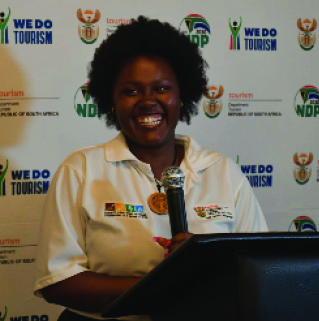
The programme was offered to over 252 unemployed youth, in KwaZulu-Natal and the Western Cape. The graduates were trained as qualified sommeliers and are now equipped with extensive knowledge of the craft of wine pairing.
Wine pairing is a highly sought-after service offering in the hospitality industry and contributes positively to South African tourism.
Lusanda Mteza (27) from Inanda Newtown in KwaZulu-Natal is one of the graduates who were accepted into the programme.
She recalls coming across the advert on social media and decided to take a chance, which soon proved to be fruitful.
Being unemployed, Lusanda says that she was unsure of what career path to pursue but she always found herself fascinated with how wine was made, bottled and prepared for the market. The graduates took part in a 12-month programme, which started in November 2021.
Mteza who is now a graduate said she can’t wait to use her new expertise in wine.
“By putting into action all that I have learned,I can passionately raise the bar of South Africa’s hospitality industry.”
Mteza and her classmates were officiated with their certificates and are now recognised as qualified sommeliers accredited by CATHSSETA, Sommelier Academy and the South African Sommelier Association. Lusanda says that being a sommelier is a beautiful profession and is currently in high demand in South Africa.
She encouraged unemployed young people to continuously scout the Department of Tourism’s websites and social media pages for opportunities for the youth. Mteza added that following the training she is now qualified as a junior sommelier, bartender, drink servicing and a waitron.
“My plans for the future are to complete my Diploma in Tourism Management and then pursue a career as a sommelier. As long as you are passionate about wine, many doors will open up for you in the future,” said Mteza.
For more information about the Department of Tourism visit www.tourism.gov.za
Construction leads to a better future
Construction leads to a better future tsoanaThe entrepreneurial journey of Tando (38), a Port Elizabeth businessman and beneficiary of Coega Development Corporation (CDC) programme, has come full circle.
The CDC is the operator and developer of the Coega Special Economic Zone (SEZ), and its overarching objective is to boost economic growth and job creation through investment, in pursuit of socio-economic development.
The Coega SEZ headquarters are in the city of Gqeberha, Nelson Mandela Bay Municipality with a strategic operational footprint in South Africa and on the African continent.
Today, Mhlobiso is an investor at the Coega SEZ and garners investment in the energy, metals, logistics, automotive, chemicals, aquaculture and agro processing, maritime, and busin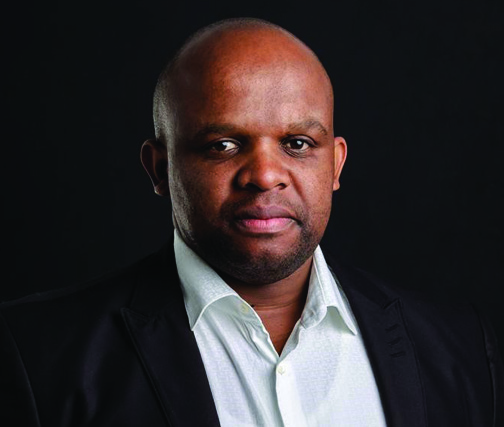 ess process outsourcing sectors.
ess process outsourcing sectors.
Having established a construction company with no background in the field, Mhlobiso runs a successful array of businesses that deliver an integrated construction service to its customer base.
When his plans of obtaining a qualification as an internal auditor were dashed due to his father’s passing in his second year at university, and the sudden financial difficulties that his family experienced, Mhlobiso pursued entrepreneurship.
While he always had a passion for business, he undertook his entrepreneurial journey much earlier than anticipated.
“I wanted to break the poverty barriers and the cycle of not being able to afford the expenses for our family’s cost of living. I saw entrepreneurship as the gateway for us to be able to break free from poverty,” says Mhlobiso.
In 2005, he started a car wash, a mobile digital distribution company and a gymnasium but like many small start-ups in the country, these ventures failed to take off. These did little to deter him.
The following year he went into business with a business partner who had a background in civil engineering and they established a construction company. Unfortunately, they had challenges and parted ways in 2009. However, he never gave up.
“I started the current company, which is still going strong 14 years later. We started with Mantishe Construction and ended up funding other divisions of the enterprise, which forms the Mhlobiso Group,” says the Founder and Manager, Mhlobiso.
Mantishe Construction paved the way for the establishment of Mhlobiso Plant Hire, Mhlobiso Asphalt, Mhlobiso Transport, Mhlobiso Concrete and Mhlobiso Properties.
Mhlobiso Concrete is the youngest addition to the Mhlobiso Group and the company recently moved into the CDC SEZ as an investor.
According to the Department of Trade, Industry and Competition, SEZs are tools to help promote industrial agglomeration, build the required industrial infrastructure, promote coordinated planning among key government agencies and the private sector, and guide the deployment of other necessary development tools.
Coega SMME Development Programme
Back in 2009, Mhlobiso enrolled to participate in the CDC's small, medium and micro-enterprise (SMME) Development Programme where he learned the ropes of the construction industry.
Beneficiaries of the programme have access to economic opportunities and benefit from its skills development programme. The programme targets SMMEs that are at least 51% black owned, with a Construction Industry Development Board (cibd) grading of 1 to 7.
Established by Act 38, of 2000, the cibd is a public entity created to lead industry stakeholders in construction development.
“I registered Mantishe construction under the Coega SMME Development Programme in late 2009. Mantishe Construction is now Grade 6CE and recently registered 6SB which is classified as highly specialised works,” he says.
Enrolling in the programme changed the trajectory of his business, providing him with the opportunity to penetrate the market, which at the time was mainly accessible to established businesses.
The programme assists SMMEs to become sustainable through raising awareness and encouraging Broad-Based Black Economic Empowerment compliance; assisting Black Economic Empowerment (BEE) certificate attainment under the amended codes; and promoting the advancement of suppliers within the CDC’s supply chain.
“Coega would create packages for Grade 1 to Grade 3s to come in under main contractors and learn from the established businesses. They created an opportunity for us to learn and grow. I quickly learned about cash flow, how to manage the site and manage employees. I learned a lot during that time and it prepared me to take on contracts independently. It made me a better contractor,” he says.
His companies employ 150 people, but it took him about 16 years to get where he is today.
To participate in the SMME programme, enterprises can register on the CDC database. Application forms are available on (www.coega.co.za > Coega Services > SMME). - SAnews.gov.za
Do not wait until last minute to apply for NSFAS funding
Do not wait until last minute to apply for NSFAS funding JoyAlthough the National Student Financial Aid Scheme (NSFAS) will close for applications for funding on 31 January for the 2023 academic year, the scheme advises applicants to apply now and not wait until the last minute.
NSFAS offers financial aid to learners who wish to study or are already studying at a public university or Technical and Vocational Education and Training (TVET) college and come from a family with an income of R350 000 or less.
According to NSFAS, applicants who are approved for its funding are covered for registration, tuition, allowance for food; accommodation or transport; learning material; and personal care.
To qualify for NSFAS bursary, you need to be a South African citizen who plans to study in 2023 or you are already studying at a public university or TVET college.
Requirements
- You qualify for funding if:
- You are a recipient of the South African Social Security Agency (SASSA)
- grant, or
- You are a person living with disability, with a combined household income of not more than R600 000 per year, or
- You are currently studying and are academically eligible.
How to register or apply?
- To apply for funding, you need to register for a @myNSFAS account by following these steps:
- Visit www.nsfas.org.za
- Click on the myNSFAS tab at the top right of your screen.
- Fill in your personal details as they appear on your Identity Document.
- Fill in your valid contact details (NSFAS will use this to communicate important updates regarding your application).
- Accept terms and conditions by ticking on the box provided. This action is compulsory and will allow NSFAS to validate the information provided.
- Create a password to protect your account, confirm password then click on ‘CREATE’.
- A message confirming your account creation will pop on the screen.
- “Remember to always keep your personal details and passwords private to avoid identity theft or scammers accessing your profile,” says NSFAS.
- It adds that applicants should be careful of fake online pages posing as NSFAS, as it could be scammers trying to collect their personal details.
- Applicants must be in possession of the following documents when they apply:
- Copy of ID/Birth Certificate
- Copy of parent/s or guardian/spouse ID
- If you have a Smart card, both sides of card required
- Proof of income (where applicable)
- Persons living with disability should complete the Disability Annexure A form, which is available on NSFAS website
- If you are recognized as a vulnerable child by the Department of Social Development, you must provide a complete Vulnerable Child Declaration form completed by a social worker
- If you indicate that you don’t have certain family member details and or abridged birth certificate, you must complete the Declaration: Non-SASSA
- “The system will generate a list of required documents for upload based on your application,” says NSFAS.
For more information, visit www.nsfas.org.za or follow @myNSFAS on Twitter, MyNSFAS on Instagram or National Student Financial Aid Scheme on Facebook.
Driver’s license renewal made easier and quicker
Driver’s license renewal made easier and quicker ReneilweMotorists will no longer have to wait in long queues to renew their driver's licences, thanks to the new Road Traffic Management Corporation (RTMC) driver’s license renewal system which saves them time.
“This system dramatically cuts the time it takes to apply for a new driver's licence or temporary driver's licence. It also reduces the application process to less than 10 minutes. We are now also able to verify the identity of the applicant with Home Affairs which helps eliminate identity fraud,” said RTMC General Law Enforcement Manager Sydney Mogaecho.
He explained that the new system has been rolled out to Driver's Licence Testing Centres in Gauteng, including the Eco Park in Centurion and the Waterfall Office Park in Midrand.
Since October 2021 when the new system was launched, about 176 000 licenses have been processed.
There are plans underway to rollout the system to other parts of Gauteng and there-after to KwaZulu-Natal, Free State, Western Cape, Northern Cape, Limpopo and Mpumalanga. The process will eventually be rolled out across the country.
He explained that the system was introduced to improve services in driver's licence centres.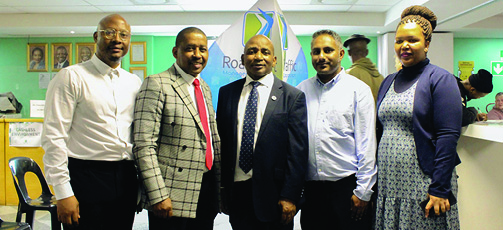
“Licence centres are notorious for long queues and uncaring staff attitudes and the new system is intended to do away with that and introduced efficiency and friendly service,” he said.
Renewing your driver’s licence
Mogaecho added that in order to renew your driver’s license the first step is to make an appointment with the National Traffic Information System’s (NaTIS) online system and choose a suitable date.
This will be followed by a visit to a testing centre where upon arrival, motorists will be asked to produce their identity documents and then do fingerprint verification. The verification process is linked to the Department of Home Affairs which confirms the details of the applicant.
The motorists are then assisted with conducting an eye test and asked to make a card payment. Cash payments are not allowed.
“The system is accessible to all members of the public who are applying for driving and temporary driver's licence at our centres,” he said.
A happy motorist, Themba Hlongwane who recently visited the RTMC offices in Centurion Centre said he was happy with the assistance he received.
“I’m impressed with the new system, all went well, I didn’t have to take leave, am now going back to work,” he said.
Smart DLTCs
In June 2022, the Gauteng Department of Roads and Transport (GDRT) opened a first of its kind, smart DLTC at the Gautrain Midrand station.
The centre is one of four new stations set to be delivered by the GDRT in collaboration with the Gautrain Management Agency (GMA) and the RTMC to add capacity that will help address licence renewal backlogs in Gauteng.
The new centre will offer services such as applications for driver’s licence and renewals, issuing of temporary driver’s licence as well as payment of traffic fines.
Visit online.natis.gov.za
The centres operate from 8am – 9pm from Monday - Friday, and from 9am – 9pm on Saturday and Sunday. You can call Eco Park in Centurion at 012 999 5200 or Waterfall in Midrand at 011 266 2000
Free from alcohol addiction and doing better than ever
Free from alcohol addiction and doing better than ever ReneilweAbusing alcohol and drugs as a coping mechanism instead of seeking professional help or reaching out to your loved ones for support can do you more harm than good.
In the words of a fully recovered alcoholic, Themba Mzima (30) of Katlehong in Ekurhuleni: "Abuse of drugs and substances like alcohol do not solve any problems in life."
After his mother passed away, Mzima became addicted to alcohol.
“I was drowning in sorrow,” he says. Mzima says he resorted to excessive drinking of alcohol in order to cope with his pain and suffering, until he was addicted and things took a turn for the worse in his life.
His wife left him because of the addiction, his children were also taken away from him and his job was in jeopardy.
“I was at the verge of losing it,” he says.
To deal with his addiction, Mzima went to the Life Recovery Centre (LRC) in Randfontein, which is a rehabilitation facility that is run by the Department of Social Development (DSD).
At LRC, he attended counselling sessions with a social worker. He also participated in various classes and activities that were helpful enough to get him out of the addiction.
The rehabilitation programme lasted for eight weeks and he got a compliance certificate after completion.
“Getting rehabilitated help me save my job at the Very Important Persons (VIP) Protection Services and the relationship with my children also improved drastically,” he says.
“I am very thankful to the Department of Social Development and the social worker helped me a lot, I am still in contact with her,” Mzima adds.
According to the Social Development Minister Lindiwe Zulu, there is a link between substance abuse and some social ills such as child negligence, Gender-Based Violence and Femicide (GBVF), teenage pregnancy, criminality, HIV infections and other diseases.
"Substance abuse is the root cause of other social ills that ruin the lives of South Africans," she says.
With collective efforts from communities, non-governmental organizations, government, individuals and other stakeholders, the Minister believes that the fight against alcohol and substances can be overcome.
To combat these challenges, the DSD runs various community outreach programmes and social media campaigns that encourage and educate the public to stay away from drugs and addictive substances.
The #KeMoja and #IamFineWithoutDrugs trends mostly targets young people.
There are rehabilitation centres nationwide where people who need help get professional help until they are fully recovered.
The eight-weeks recovery programme includes medical and psychological support.
According to Advanced Psychiatric Nurse at Dr. Fabian and Treatment Centre in Pretoria, Chantel Moshwana, a person has to get a physical examination by a medical doctor and a report from a psychosocial worker from a government clinic to prove fitness for rehabilitation.
“After a pass, they get admitted and undergo a seven days detox programme at the sick-bay unit. These are very crucial days because that is when most patients have withdrawal symptoms and feel sick. We cure the symptoms," she says.
When they have detoxed, they get rehabilitated and also attend skills development programmes.
You can follow the Facebook Page of Life Recovery Centre (LRC): https://m.facebook.com/profile.php?id=1829708573938500
How to access drugs and substance abuse rehabilitation centres in your province
How to access drugs and substance abuse rehabilitation centres in your province ReneilweGovernment has intensified its efforts to combat substance and alcohol abuse through intervention programmes in all provinces.
There are Provincial Substance Abuse Forums and Local Drug Action Committees at municipalities to enhance existing community initiatives with knowledge and skills to manage their own prevention work at grassroots level.
The committees are supported by the Central Drug Authority (CDA), which is a government body that consists of experts in medicine, law enforcement and community mobilisation.
The Department of Social Development has rehabilitation centers that are equipped with qualified professionals and resources that help alcohol and substance abuse addicts to recover and provide families much needed support.
List of rehabilitation centres across the nine provinces:
• Gauteng - Dr Fabian and Florence Rebeiro Treatment Centre - 012 734 8300
• Mpumalanga - Swartfontein Treatment Centre- 013 750 9918/16
- Nkangala Rehabilitation Centre - 013 665 0620
• Eastern Cape - Ernest Malgas treatment Centre - 041 454 0058/076 922 1885
• Kwa-Zulu Natal - Madadeni Township - 034 329 2011
- Newlands Park Treatment Centre - 031 578 3992
- Khanyani Treatment Centre- 034 317 3802
• Western Cape - Kensington Treatment Centre - 021 511 9169
• North West - JB Marks Treatment Centre- 018 294 5134
- Taung Treatment Centre - 053 994 1379
• Free State - Charlotte Maxeke Treatment Centre- 051 533 0815/ 051 533 0800
- Beyers Naude Public Halfway House -066 486 6906/ 066 487 6160
• Northern Cape - Northern Cape Substance Dependency Treatment Centre- 053 802 3300/ 053 874 9103
• Limpopo - Seshego Treatment Centre - 015 233 7016/7
Labour Relations
Labour Relations tsoana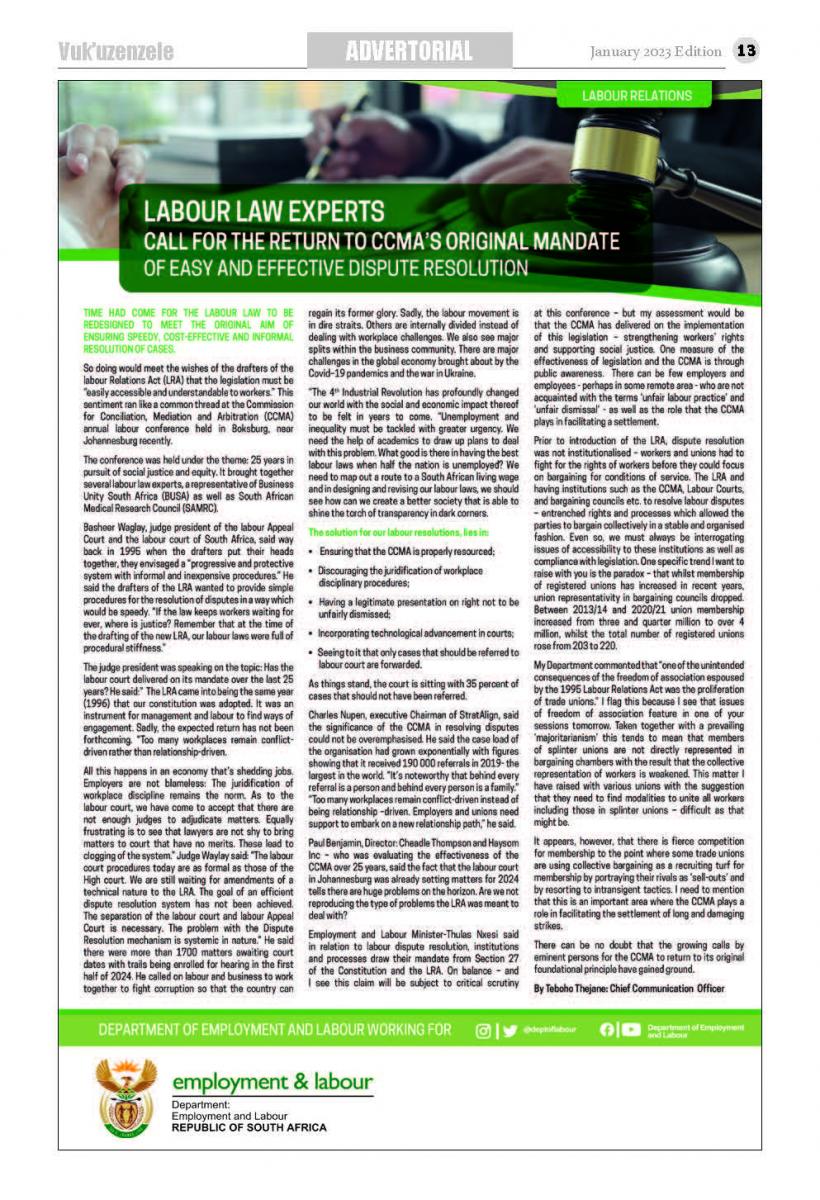
Maarman ready to be seen through photography
Maarman ready to be seen through photography ReneilweBradley Maarman (28) has turned his interest in photography into a business after receiving business management training from a non-profit organisation called Mfesane.
As a self-taught photographer, Maarman runs Be Seen Solutions which captures fashion, food, weddings, and family portraits.
Maarman who is from Saldanha Bay in the Western Cape says he had to quit his job in Johannesburg and return to his hometown to take care of his sick grandmother.
With very few job opportunities in Saldanha Bay, he felt stuck about the future but remembered that he had an interest in photography.
Maarman’s lucky break came in 2022 when his friend introduced him to a job creation programme facilitated by Mfesane.
This NPO received a grant from the National Development Agency (NDA) to provide skills programme, targeting youth, with an end goal to graduate participants into real job opportunities. The NDA is an agency of government responsible for contributing towards the eradication of poverty in South Africa and its causes by granting funds to communities implementing development programmes.
Maarman grabbed the opportunity and started a photography business.
He received training in human resources and business management skills. Mfesane also assisted Maarman with new equipment which included a camera, tripod, drone and lighting materials to kick-start his business.
“I never thought it was possible, but Mfesane and the NDA managed to turn my dreams of running a business into a reality.
“My business is making a profit and I’m thankful for my clientele.”
Be Seen Solutions is currently a one-man business, Maarman has a personal assistant who occasionally styles his shoots.
The Mfesane programme has to date produced 30 youth start-up companies in the Western Cape.
Mfesane CEO, Yolandi Afrika said the organisation’s vision of empowered communities is being realised through this partnership with the NDA.
“I wish all the participants well in establishing their businesses. They can only grow from here as they have already demonstrated their determination and willingness to succeed through participation in the programme,” she said.
For more information about Mfesane visit www.mfesane.org.za
For more information about the NDA visit www.nda.org.za
Media freedom in South Africa is cause for optimism and pride
Media freedom in South Africa is cause for optimism and pride JoyA free press is among the most significant dividends of our democracy, yet it is one that we perhaps take the most for granted.
In South Africa barely 45 years ago, the very practice of journalism was seen as a threat to the stability of the state.
In reflecting on how things have changed since the advent of democracy the real-time barometer on global press freedom published by Reporters without Borders (RSF) is instructive.
At the bottom of each country report is an infographic detailing abuses of journalists.
One considers for example that this year alone 45 journalists and 4 media workers have been killed in various parts of the globe in circumstances relating to their work. Also, this year, 207 journalists and 7 media workers have been imprisoned.
In South Africa, no journalists were killed in 2022 in circumstances relating to their journalistic activity and none were imprisoned. This was also the case last year, the year before and in the years preceding them.
This is an indicator of the robust health of not just our media but of democracy itself.
That journalists are free to ply their trade without fear of retribution is something we can be extremely proud of. In South Africa, media can publish and broadcast freely, and the media regulates itself through various mechanisms such as the Press Code.
Tabloid style journalism exists alongside serious reportage. Serious, informed critique exists alongside gossip-mongering and broadsides against public personalities, celebrities and politicians.
As the head of state, I am the subject of different media products on a near daily basis. That the President should be consistently in the media’s crosshairs is to be expected and I will continue to take it in my stride.
Media freedom is a fruit of democracy and one we must all jealously safeguard and strive to uphold.
This is particularly the case when there are attempts to intimidate, threaten or silence journalists using online and other platforms. This was particularly witnessed during the state capture era.
What was most disturbing were the attacks directed at female political journalists on social media platforms, using misogynistic terminology and even accompanied by threats of sexual violence.
Given this regrettable period in our not-too-distant past, it is of concern that we are seeing a resurgence of online and other forms of abuse directed against journalists in our national life.
The ill-treatment of journalists that is happening in so many parts of the world is something that should not be allowed to happen in South Africa. The media plays an unparalleled role in ensuring there is accountability in our democratic order, so we must all stand firm against any attempts to intimidate or silence journalists.
 Despite our gains around press freedom, this year South Africa’s ranking in the RSF World Press Freedom Index dropped three notches since 2021.
Despite our gains around press freedom, this year South Africa’s ranking in the RSF World Press Freedom Index dropped three notches since 2021.
There are multiple facets to media freedom. Journalists’ safety is just one indicator; the others are political and economic context, legal framework and sociocultural context. The index cites accessing quality journalism via paywalls as an economic barrier for citizens, the impact of the COVID-19 pandemic on funding for small and independent media to operate and online smear campaigns by political parties directed at journalists.
Another factor that is heavily impacting the state of journalism not just in South Africa but around the world is the threat posed by disinformation.
The steady encroachment of disinformation being disseminated online and even by established media outlets is worrying. Its potential to cause harm extends way beyond the confines of an individual consumer of news.
We witnessed first-hand the devastating impact of this during the 2021 July unrest in several parts of the country, when false information disguised as reportage inflamed tensions between communities and was used to mobilise people to commit criminal acts and even to incite violence.
In the disinformation age, we need more media, not less.
The only counter to the proliferation of disinformation is the growth and expansion of credible news media outlets. The only counter to bad journalism rife with political agendas and ‘purging crusades’ is credible, well-trained journalists whose only interest is educating and informing the public.
Both government and the private sector are called upon to play their part in supporting the free press by ensuring its sustainability through advertising, content partnerships and other models.
We salute our nation’s hardworking journalists, editors and other media workers who continue to fulfil their important role in the service of democracy.
Melodies to empower Mamelodi youngsters
Melodies to empower Mamelodi youngsters tsoanaChildren and youth from disadvantaged families in Mamelodi East, Gauteng and surrounding areas are being given a life-changing opportunity through music.
Mamelodi Music Conservatoire (MMC) is a non-profit organisation founded by Mmatapa Ramatjela in 2009, while she was studying towards a Bachelor of Music degree at the University of Pretoria (UP).
The organisation offers classical music lessons to children and youth aged between 7 and 22 years-old who stay in and around Mamelodi East.
“Our mission is to address the growing need and shortage of classical music education in Mamelodi, and to curb crime and drug abuse amongst youth,” says R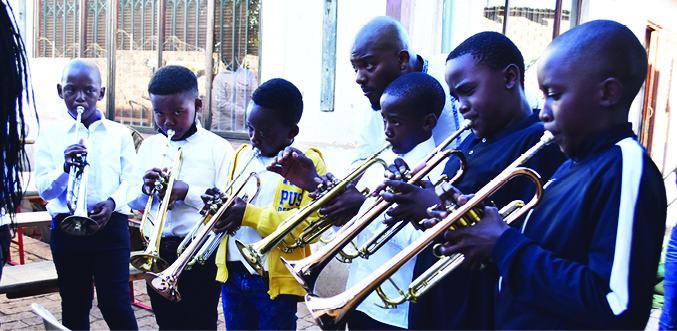 amatjela.
amatjela.
The MMC offers classes on Saturdays from 8am until 5pm and during school holidays at Koos Matli Primary School to 82 students.
They learn how to play different music genres and to perform in youth orchestras' and community events.
The lessons include music history and theory, playing instruments including violin, viola, cello, guitar, voice, recorder, bassoon, piano, trumpet, and trombone.
“The support that we receive from parents is amazing because they are involved in the project,” she says.
Bringing the idea to life
Ramatjela was inspired to establish the organisation in her first year of study at UP when her music education lecturer required students to create any type of music-related business. She recruited her friend, Anna Moila and pitched the idea to her.
“Moila agreed to h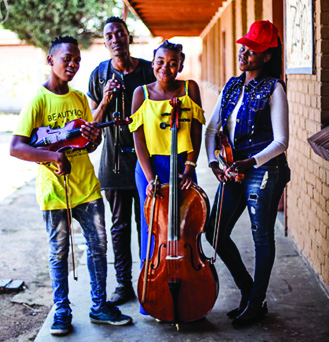 elp me bring the idea to life. We visited different primary school principals in Mamelodi East to sell the idea and they supported us,” she says.
elp me bring the idea to life. We visited different primary school principals in Mamelodi East to sell the idea and they supported us,” she says.
According to Ramatjela, MMC operates under the University of South Africa (Unisa) Music Foundation, which supplies instruments and maintenance, accredited music teachers, books, and exam fees.
With guidance from qualified and dedicated music teachers, MMC students also enrol for practical and theoretical examinations at Unisa music department, which awards them with certificates when they have passed.
“Our learners also perform at the Unisa Tshwane Metro Festival annually. They also enter for the Pretoria Eisteddfods, and in 2022, we were fortunate enough to have been invited to open the stage at the tribute concert at Moretele Park,” she says.
Ramatjela adds that some of the students are part of the Unisa Music Foundation Orchestra, the Unisa Music Foundation Youth Orchestra and the North West University Symphony Orchestra. She wishes to establish a Mamelodi Youth Orchestra.
Apart from keeping the children occupied, Ramatjela says MMC wishes to make available an essential service in the community, and create jobs for students who have completed their degrees in various fields of art and administration.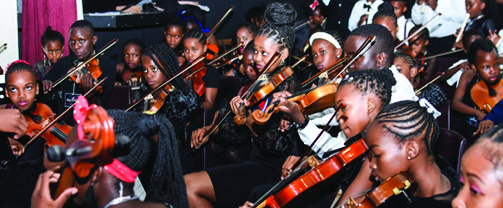
“The main challenge that we are facing is lack of funding, because we wish to include more teachers, buy instruments and accessories including music stands, pick-ups, and guitar foot stools; and to pay the supporting staff,” she says.
The organisation is also struggling to secure a permanent place to run operations and to store equipment.
“We have applied for land through the City of Tshwane. We are still awaiting outcomes,” she says.
How to join
Parents who would like to enrol their children to MMC can submit applications at Koos Matli Primary School in the beginning of January (on Saturdays) until the end of the month. Applications are also open in June.
“We only admit children who cannot afford to pay for music tuition. Their parents must be unemployed or earning less than R7 000 salary per month,” she says.
“They also have to pay a once-off R450 fee and submit the applicants birth certificate/ID copy with the application form,” Ramatjela said.
For more information, contact Khensani Khumalo: 081 536 9508 or Julliet Ndlovu: 081 811 8367.
NSFAS enables youngsters to change their lives
NSFAS enables youngsters to change their lives JoyBongumenzi Mvelase is on the right path to realise his childhood dream of becoming a top advocate after receiving funding assistance. The 22-year-old third-year law student from the North-West University (NWU) is a beneficiary of the National Student Financial Aid Scheme (NSFAS).
Mvelase who is from Utrecht in KwaZulu-Natal, lost both his parents at a young age and was raised by his grandparents. Sadly, they also passed away when he was in Grade 10, which forced him to relocate to Gauteng where he completed his matric while living with other family members.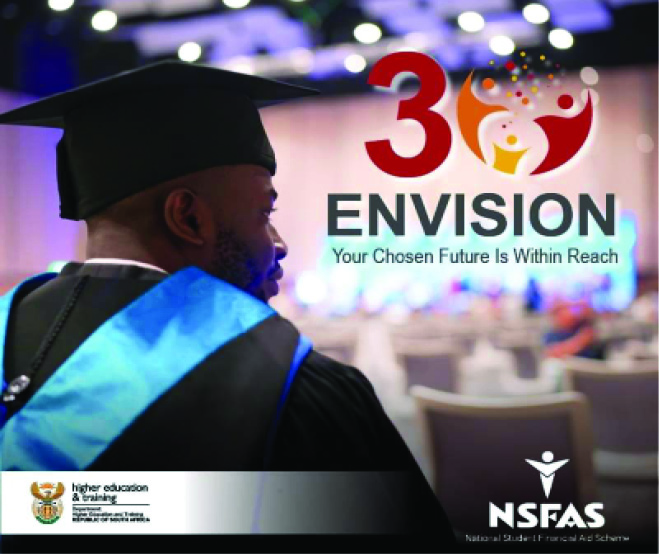
However, Mvelase says he remained committed to his childhood dream and studied hard to achieve the minimum requirement to be admitted to the university. As per the NWU entry requirements for a Bachelor of Laws, Mvelase obtained level 5 (60–69%) in English and Isizulu and level 3 (40–49%) in mathematics. His admission point score, which is an average of all subjects – excluding life orientation – was 32.
Mvelase says his consistently good performance in matric and support from his family and teachers inspired him to hold onto his dream of becoming a lawyer and he began to look for funding opportunities.
He learnt about the NSFAS at a career day and applied in his final year at high school. He says that he found the process easy and did not battle when he arrived at the university in his first year.
The NSFAS provided him with a full bursary that covered tuition and study fees, accommodation, book allowance and a monthly allowance of R1 500 for food. He says being an NSFAS beneficiary was a relief to him because he could focus on his studies and not have to worry about money.
He uses part of his allowance to travel back home to KwaZulu-Natal during the school holidays.
While he realises that he has a long journey ahead of him before he is admitted as an advocate, he is grateful for the journey he has travelled so far.
“There were moments where I was not sure what I would do after matric because you need money to go to university, so I’m glad that the NSFAS has brought me this far, even though there is still a long way to go,” he says.
Responding to his career choice, Mvelase says he learnt from an early age that legal costs were not affordable for ordinary people and he hopes to help others once he establishes himself in the legal fraternity. He aspires to be a human rights lawyer to make an impact in his community, particularly on issues about land reform, which he says are still unresolved in his village.
He says being in university has been a life-changing experience for him. He has met inspiring people who are in a position to help him achieve his goals.
“I have taken part in many programmes that helped me understand the career I have chosen. I get to meet people who are excelling in the field; it is an exciting experience,” he says.
Support for students
 Mvelase encourages prospective students who cannot afford study fees to apply to the NSFAS to realise their dreams.
Mvelase encourages prospective students who cannot afford study fees to apply to the NSFAS to realise their dreams.
He cautions, however, that it is challenging for students – particularly those from underprivileged families who have not travelled much – because they are miles from home. He is concerned about fellow beneficiaries who end up dropping out because of their poor academic performance. Students who are feeling overwhelmed, he says, must use the university’s facilities for mental and psychological support.
He says one of the NSFAS conditions for students keeping their bursary until graduation is that they perform well academically.
“The NSFAS brought hope to many of us from disadvantaged backgrounds. I would encourage everyone out there, particularly those coming from rural areas, to submit their application on time and improve their pass rates so they can pursue the careers of their choice.
“We must also understand that while it all sounds good and free, someone is paying for us through tax. We must not abuse the opportunities,” he says.
Packhouse changes local farmers’ fortunes
Packhouse changes local farmers’ fortunes ReneilweThandeka Sifunda (33) is the chairperson of Umsekelaze Cooperative which recently received a R4 million worth packhouse which will be used to store and pack fresh fruit and vegetables before they are sold.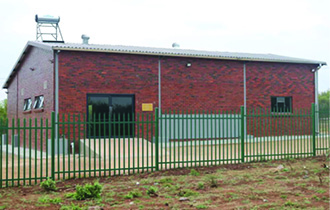
The packhouse was handed over to cooperatives in the Nkomazi Local Municipality by the Deputy Minister of Agriculture, Land Reform and Rural Development (DALRRD), Nokuzola Capa, together with Mpumalanga MEC for Agriculture, Rural Development, Land and Environmental Affairs, Busisiwe Shiba recently.
The handover of the Mzinti Mini Packhouse means that local farmers, who are mostly young people, will no longer worry about their fresh produce rotting. They will now be able to store their produce it in a place where it will remain fresh for a longer period.
“Before this development, we had relied heavily on the old method of sprinkling water on our harvest to keep it fresh, and that was not helping us,” said Sifunda.
She explained that their cooperative is based in Ka-Mdladla, Nkomazi and is managed by young people between the ages of 27 and 33. It was registered as a cooperative in 2019 but had been operating informally since 2010.
“It has always been a painful experience to watch our produce rot because our target market could not consume all our goods in a very short period of time,” she said.
The local cooperatives produce red onions, strawberries, cabbages, tomatoes, butternuts, beetroot, green and red peppers.
“The initiative does not only help us as cooperatives that are in operation, but will also help in unearthing upcoming farmers who will see its importance. There may be other young people who are sitting at home, totally discouraged to start their own farming businesses because they fear that they might lose all their stock, but now that there is a packhouse in our area,” Sifunda added.
Umsekelaze Cooperative has five full-time employees, but also employs casual workers to assist when there are additional farm tasks that need to be completed.
For more information about the Department of Agriculture, Land Reform and Rural visit www.dalrrd.gov.za
Rabbit Hemorrhagic Disease confirmed in parts of SA
Rabbit Hemorrhagic Disease confirmed in parts of SA ReneilweThe Department of Agriculture, Land Reform and Rural Development (DALRRD) has confirmed the outbreak of Rabbit Hemorrhagic Disease (RHD) in the Western Cape and Norther Cape provinces.
The department said it has received reports of die-offs of wild rabbits and hares from the Karoo areas in the Western and Northern Cape.
“State veterinary services, private veterinarians and the Department of Forestry, Fisheries and the Environment were involved in field investigations. Post-mortems were performed and samples collected to confirm the cause of the deaths.
“Diagnostic tests were performed at the Onderstepoort Veterinary Research Laboratory and the cause was confirmed as Rabbit Haemorrhagic Disease,” the department said in a statement.
RHD is a disease caused by a virus, Calicivirus, resulting in a high number of deaths in rabbits and hares, and the sudden death of animals due to bleeding in the organs including the liver, kidney and spleen.
The department said this is the first detection of the disease in South Africa and at this stage, it is still unclear how the disease could have entered the country, since the importation of rabbits and hares is not allowed.
The department said investigations are underway to determine whether illegal importation could be the source.
“Control of RHD in rabbitries relies mainly on vaccination, but the vaccine is not available in South Africa. This increases the importance of biosecurity measures in rabbitries and anywhere where rabbits or hares are kept.
“Biosecurity measures are difficult to implement in wild populations. The occurrence of RHD in the Karoo is therefore of great concern, as our indigenous Red Rock rabbit, endangered Riverine rabbit and hare species are highly susceptible to this disease,” the department said.
The department warned that carcasses of RHD-infected rabbits might be a major source for viral spreading, since the virus seems to be highly resistant and stable, even when exposed to harsh environmental conditions.
Rabbit owners have been advised to ensure that their rabbits are secured and must prevent any contact with other rabbits or hares, either directly or indirectly through people or equipment.
Members of the public have also been encouraged to report any dead or dying rabbits or hares to the nearest State veterinarian for investigation. – SAnews.gov.za
For more information visit www.dalrrd.gov.za
SAB multi-million investment restores hope for KZN economy
SAB multi-million investment restores hope for KZN economy tsoanaThe South African Breweries (SAB) has injected a multimillion rand investment that will create over 25 000 job opportunities and rekindle the hopes of KwaZulu-Natal (KZN) residents.
The SAB’s R825 million expansion project at its Prospecton Brewery in the South Durban Basin is set to expand the SAB’s operations after setbacks, including the COVID-19 pandemic, the July 2021 unrest and looting and the devastating floods in April and May this year.
The investment, announced by SAB Chief Executive Officer Richard Rivett-Carnac will also benefit local suppliers to the tune of R652 million, as the brewery is going to procure services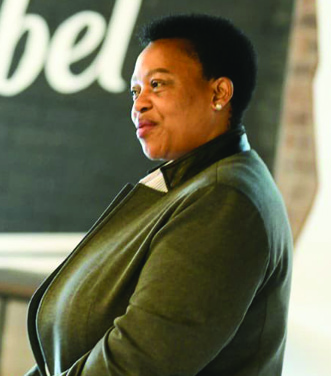 from them.
from them.
KZN Premier Nomusa Dube-Ncube says the investment is an overwhelming vote of confidence in the future of the province.
“As the provincial government, we are pleased that this investment will lead to the creation of 25 000 additional jobs throughout the value chain and we can safely say that it will positively impact at least 125 000 people in our province,” she says.
The Premier also commended SAB for showing confidence in the province. The SAB will, over time, inject an additional R4.4 billion into the province’s Gross Domestic Product.
“Indeed, this is a major boost for the KZN economy, as it goes beyond the bricks and mortar here at SAB to impact the economic growth of not only the province, but by extension, our country as well. This investment also has an important effect to shine the spotlight on KZN and to attract further investment into our local economy,” She says.
She adds that SAB is already a major player in the province, with 572 direct employees, with 50% of them based in Prospecton.
“Furthermore, the SAB has established a firm socio-economic footprint in the province with the company investing more than R20 million per annum in socio-economic development ventures, thus making a huge impact in the development of KZN communities,” the Premier says.
She reaffirmed that the provincial government is hard at work to rebuild the province so that it becomes a destination of choice for investors.
Responsible drinking campaign
Premier Dube-Ncube also commended the positive initiatives being rolled out by SAB through its campaign known as the SAB ‘reality check’ advertising campaign and responsible drinking , which encourages responsible drinking.
“The responsible drinking campaign demonstrates that the SAB is serious about playing a role in reducing and preventing the harmful use of alcohol and in being a good corporate citizen.” – SAnews.gov.za
SETAs ready to bridge the skills gap
SETAs ready to bridge the skills gap tsoanaIf you have just completed your matric and have little prospect of furthering your studies or you do not know what to do next, maybe acquiring a skill through the Sector Education and Training Authority (SETA) is for you.
SETAs offer learnerships at different times of the year. There are no costs in applying for these learnerships and you are also paid while you are doing the learnership.
Learnerships combine workplace experience with formal training so you will get a formal qualification and have real work experience.
Minister of Higher Education, Science and Technology Blade Nzimande has encouraged South Africans to look for opportunities within SETAs.
“For further training and skills development opportunities offered by SETAs, I invite all South Africans to interact with our SETAs through their websites and that of the Department of Higher Education and Training,” said Minister Nzimande during a press briefing following a meeting held with SETAs recently.
South Africa has 21 SETAs that are responsible for contributing to skills development and bringing skills to both unemployed and employed people.
This is done by ensuring that people learn skills that are needed most by employers and communities. The end result is to improve employability of the trainees.
According to the National Skills Fund (NSF), training and skills development is not just for young people starting their first jobs, but it is open to anyone who wishes to learn a new skill and it can be accessed online.
The NSF is a public entity that reports to the Ministry of Higher Education, Science and Technology which also decides the skills to be focussed-on, informed by the country’s needs.
The NSF's role is to provide funding for national skills development that contributes to improving economic participation for all. It also works closely with the country’s SETAs on matters related to national skills development and training outcomes.
According to the NSF, the functions and duties of a SETA are to:
- Develop a skills plan
- Implement its sector skills plan
- Promote learning programmes
- Register agreements for learning programs.
To find out more, visit www.dhet.gov.za/ and click on SETAs.
South Africa is set to become a drug free country
South Africa is set to become a drug free country ReneilweIn an effort to win the war against drugs and substance abuse in South Africa, Social Development Minister Lindiwe Zulu launched the National Drug Master Plan (NDMP) 2019- 2024 in June 2020.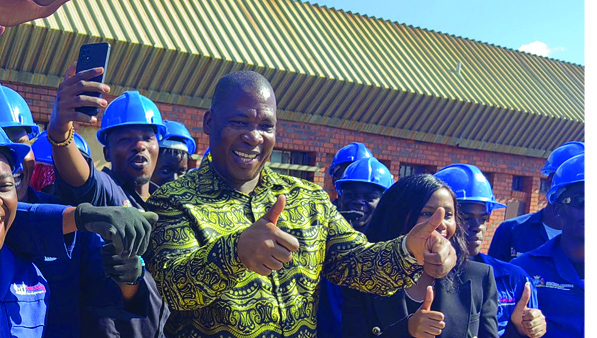
The NDMP is a five-year programme of action that focuses on demand, supply and harm reduction strategies, and it aims to realise a drug free South Africa. It is implemented by various government departments and stakeholders.
The NDMP recognises that the country has become a consumer, producer and a transit country for drugs. Because of this, it is easy for vulnerable people like the youth to access drugs and get addicted quickly, and this leads to far reaching effects on the users, families and the society.
To realise a drug free South Africa, government has intervened through the NDMP's evidence-based public health and social justice principles that focus on helping affected people.
“The NDMP is a blue-print for combating the scourge of alcohol and substance abuse which has reached epidemic proportions in South Africa. The overarching goal of the NDMP is to prevent drug use before it starts, early intervention to ensure substance users receive treatment and rehabilitation services and reducing the demand for illicit drugs,” says Minister Zulu.
Gauteng launches a 24-hour anti-substance abuse helpline
Recently, Gauteng Premier Panyaza Lesufi officially launched a 24-hour toll free Anti-Substance Abuse helpline, a first of its kind in South Africa.
The helpline is one of government’s response dedicated to assist addicts who need rehabilitation but cannot afford to go to private facilities.
The helpline has five social worker managers, 18 supervisors, 137 social workers and 23 auxiliary workers with more than 6 000 cases that have already been logged since October 2022. Most people who contact the helpline are families that seek help for their loved ones.
The Premier says other provinces have shown interest in adopting the same idea.
In order for addicted people to get admitted at a rehabilitation centre in Gauteng through the helpline, they have to give consent and then go for screening, medical examination and mental evaluation.
After passing these stages, they go through a detox programme in a rehabilitation center.
As part of the rehabilitation programme, the patients attend skills development programmes and also get access to bursary opportunities and other available resources.
“We have to ensure that there are sporting activities, poetry sessions, and other extra-mural activities at community centres for the youth so that they do not get bored, especially during school holidays,” says Premier Lesufi.
The helpline is available for people in Gauteng only. To get help, call 0800 228827 or email GPAntiSubstanceAbuse@Gauteng.gov.za or dial *134*47472# and follow the prompts.
Sugarcane ignites passion in young farmer
Sugarcane ignites passion in young farmer ReneilweWhen Slondiwe Nxumalo (29) lost her job as a safety officer in Cape Town, the Environmental and Geological studies graduate returned home to Maphumulo, KwaZulu-Natal to start over again.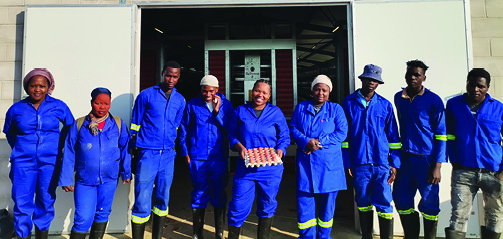
She decided to explore opportunities in the farming industry which has always been her passion.
The decision to pursue what she loves has paid off. Nxumalo now produces sugarcane that covers 25-hectares of land and together with her business partner has a 10 000 chicken layer farm.
She also employs 20 people on the sugarcane farm and seven are employed on the chicken layer farm.
“Growing up I would assist my mother to plant mealies, cabbage, spinach, and butternut. Although I was inspired to pursue a career in farming, I ended up studying Environmental and Geological studies at the University of Cape Town,” she said.
When she graduated in 2014, she had a difficult time securing a job and decided to study for a Diploma in Safety Management with the University of South Africa. She completed her studies in 2016 and secured a job as a safety officer.
After two years of employment, the company she worked for shut down and she was forced to move back home. It was during this time that her brother reminded her of her passion for farming and encouraged her to start a business as a farmer.
With financial backing from her brother, in 2019 she purchased three-hectares of land to farm vegetables. This was followed by 40-hectares of land which was for sugarcane farming.
Her vision was to establish a sustainable business but because she had no experience in farming sugarcane, she approached the National Youth Development Agency (NYDA) for guidance.
The NYDA is a government agency that supports programmes that facilitate and provide employment opportunities for youth. This is to improve the inclusion of young people in the economy, through increased job creation, entrepreneurship, and business support.
The NYDA enrolled Nxumalo in a Business Management Training Programme short course, which helped her identify that she needed to find a target market to supply the sugarcane.
“I approached Tongaat Hulett and informed them that I had a 40-hectare farm for sugarcane. I asked them if they would be interested in taking the sugarcane if I planted it on the farm. The company connected me with a land advisor who educated me about planting and harvesting. The advisor also put me in touch with a contractor who would help me on my journey,” Nxumalo said.
Tongaat Hulett enrolled her in a programme that helps to establish small-scale farmers by imparting them with the skills to grow sugarcane and providing her business with farming supplies.
The NYDA also provided her with a borehole system, which supplies water on the sugarcane farm.
For more information about the NYDA visit www.nyda.gov.za
Contact Slondiwe Nxumalo at 072 763 2231
The future looks bright for young artisan
The future looks bright for young artisan JoyWhen the Department of Higher Education and Training (DHET) launched the Decade of the Artisan campaign in 2014, Nelisiwe Duba (24) could not believe her luck as she immediately saw this as her chance to pursue a career in the trades and becomes a successful female artisan.
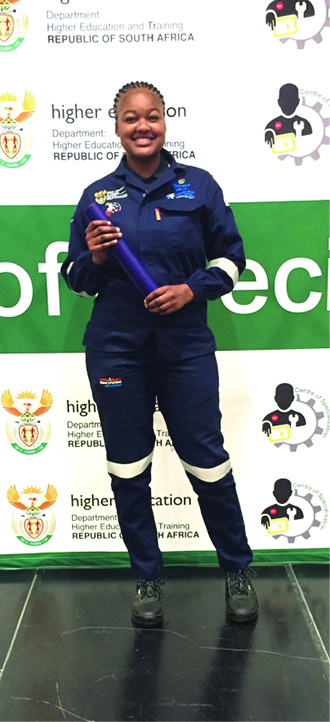 “I was still in high school when the campaign was launched,” says Duba, who hails from Ermelo in Mpumalanga.
“I was still in high school when the campaign was launched,” says Duba, who hails from Ermelo in Mpumalanga.
The Decade of the Artisan campaign aims to produce 30 000 artisans per year by 2030, as indicated in the National Development Plan (NDP) 2030 and the White Paper for Post-School Education and Training.
Since childhood, she always found joy in using her own hands to fix and create things, and it is not surprising that eight years after the launch of the Decade of the Artisan, Duba is now a qualified artisan.
In 2022, she obtained a Mechanical Fitting and Turning qualification in Manufacturing and Construction of components from Sedibeng TVET College in Vereeniging in the Vaal area.
Duba was among over 350 artisans from various Technical Vocational Education and Training (TVET) colleges who graduated during the ceremony of the Centres of Specialisation (CoS) that was recently held at Emperors Palace Hotel in Ekurhuleni.
The overjoyed Duba says she decided to pursue an artisanal career because she is a very creative and open-minded individual.
“Fitting and turning is a great fit for creative people. I also majored in Mathematics and Physical Science in high school, and that helped me to meet the requirements needed for this course,” Duba says.
She believes that artisanal careers can help people, especially the youth, to open their own businesses.
“As artisans, we are highly skilled and have gifted hands. Because job opportunities are getting scarce in our country, artisanal careers can help people open their own business and create job opportunities for the youth,” she says.
Duba encourages young people to consider artisanal careers so that they can be independent.
“With funding, you have the skills to start your own business besides working for someone else. One can do special trades or courses like welding, electrical engineering and plumbing [amongst others],” she says.
Now that she has completed her studies, an optimistic Duba says the future looks bright for her.
“I am currently looking for employment where I can apply the skills I acquired over the three-year period as an apprentice. The goal is to one day open a training centre or have a fitting and turning workshop of my own,” she says.
“Also, winning the Skills Competition that was recently hosted by Japanese International Cooperation Agency (JICA) in Cape Town, where I won a big toolbox, has been an eye opener and triggered the thought of owning a workshop one day,” she adds.
Concern over the number of artisans produced by SA
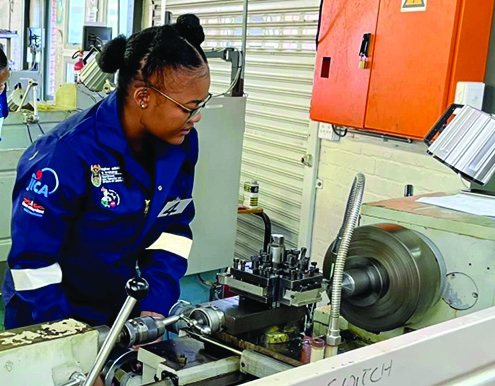 Addressing the ceremony, the Minister of Higher Education, Science and Technology, Dr Blade Nzimande, emphasised the need to drastically increase the number of qualified artisans produced per year in order to realise the country’s National Development Plan (NDP) 2030 target.
Addressing the ceremony, the Minister of Higher Education, Science and Technology, Dr Blade Nzimande, emphasised the need to drastically increase the number of qualified artisans produced per year in order to realise the country’s National Development Plan (NDP) 2030 target.
He noted a decline in the total number of learners who entered artisanal learning programme with 10 302 learners having entered the programme during 2020/21 financial year, reflecting a 36.5% (5 916) decline when compared with the 2019/20 financial year.
He says South Africa needs at least 60% of school leavers to pursue artisanal training to meet the country’s demand for the scarce skills. The country is currently producing an average of 20 000 qualified artisans per year.
“We honestly need to do more to encourage school leavers to pursue technical trades, as government expands technical and vocational education,” he says.
He adds that there is a continuous need for suitably qualified artisans to sustain industries and support economic growth in South Africa.
For more information, you can visit www.sedcol.co.za or www.dhet.gov.za for a list of SETAS
What will people say?
What will people say? tsoana